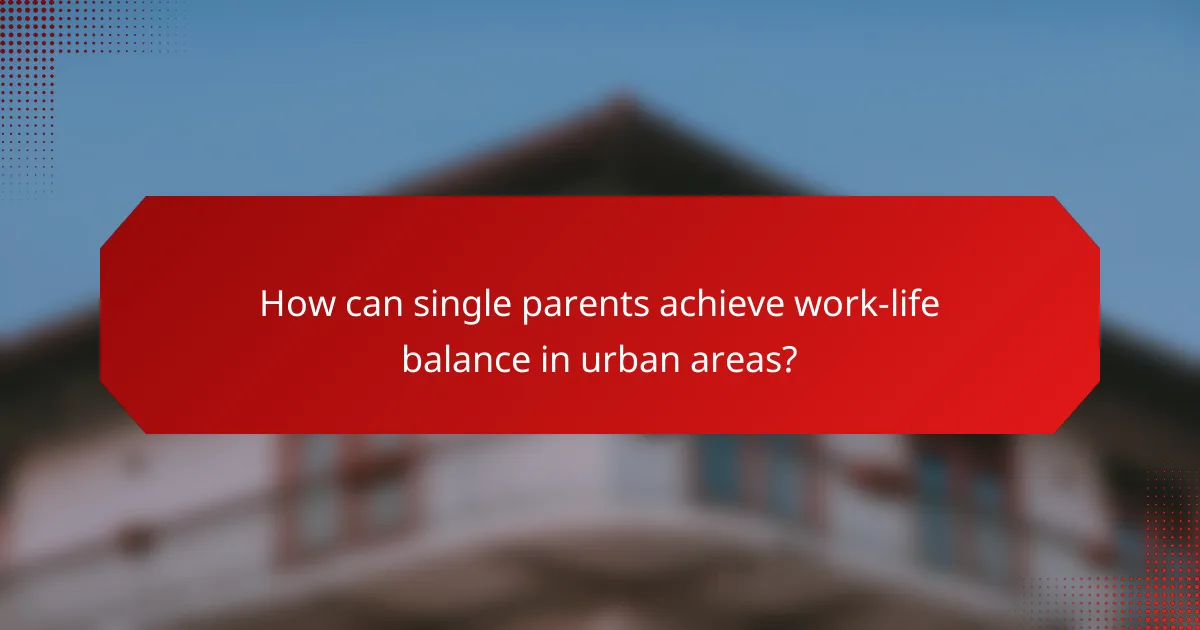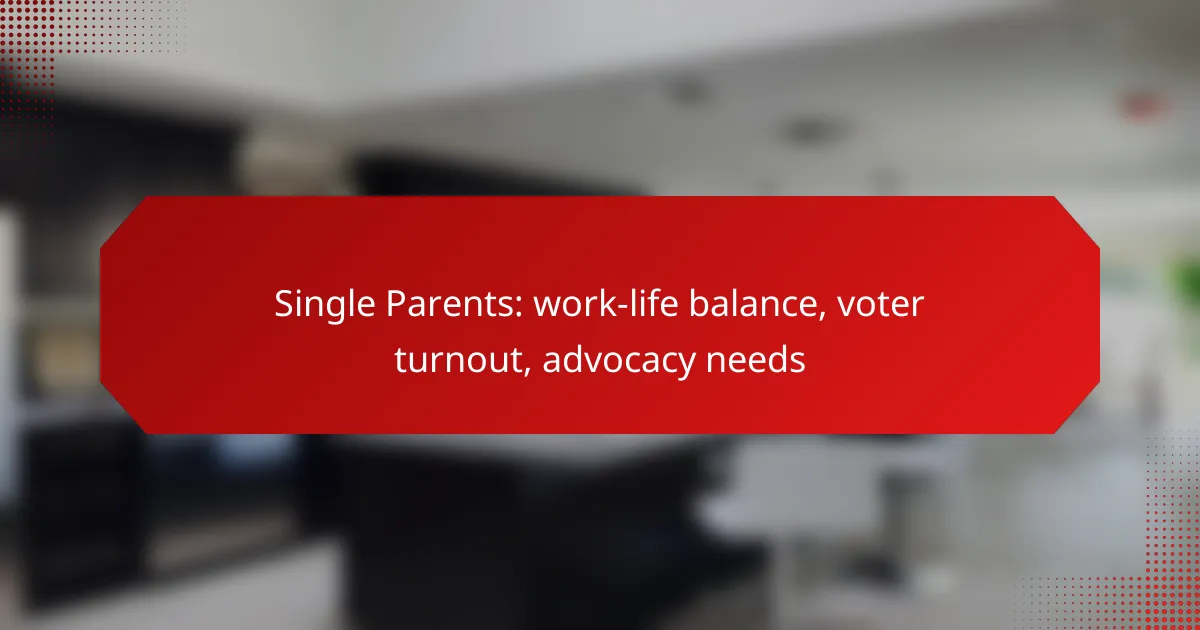Single parents face unique challenges in achieving work-life balance, often relying on flexible work arrangements and supportive childcare options to navigate their dual responsibilities. As their engagement in the electoral process grows, this demographic increasingly advocates for essential needs such as affordable housing and healthcare, which are vital for their families’ stability and well-being.

How can single parents achieve work-life balance in urban areas?
Single parents in urban areas can achieve work-life balance by leveraging flexible work arrangements, accessing supportive childcare options, and implementing effective time management strategies. These approaches help navigate the challenges of balancing professional responsibilities with parenting duties.
Flexible work arrangements
Flexible work arrangements, such as remote work or adjustable hours, allow single parents to tailor their schedules to meet both work and family needs. Many employers are increasingly offering options like telecommuting or compressed workweeks, which can significantly reduce commuting time and increase availability for family activities.
When considering flexible work options, it’s crucial to communicate openly with employers about your needs. Establishing clear boundaries around work hours can help maintain productivity while ensuring family time is prioritized. Single parents should also explore job opportunities that explicitly promote work-life balance.
Supportive childcare options
Access to reliable and affordable childcare is essential for single parents aiming for work-life balance. Urban areas often have various options, including daycare centers, after-school programs, and family care providers. Researching local resources can help identify the best fit for your family’s needs.
Consider utilizing government assistance programs or subsidies that may be available to help offset childcare costs. Additionally, forming co-op arrangements with other parents can provide mutual support and reduce expenses, allowing for a more manageable balance between work and parenting.
Time management strategies
Effective time management strategies are vital for single parents to juggle work and family responsibilities. Prioritizing tasks, setting realistic goals, and using tools like calendars or apps can help streamline daily activities. Establishing a consistent routine can also create a sense of stability for both the parent and the children.
Single parents should consider breaking tasks into smaller, manageable steps and delegating when possible. Creating a weekly meal plan or setting specific days for household chores can save time and reduce stress. Regularly reviewing and adjusting your schedule can ensure that it remains aligned with both work commitments and family needs.

What are the voting trends among single parents?
Voting trends among single parents indicate a growing engagement in the electoral process, particularly in urban areas. This demographic has shown increased participation in elections, reflecting their unique challenges and advocacy needs.
Increased voter turnout in major cities
Single parents in major cities often exhibit higher voter turnout compared to their counterparts in rural areas. Factors such as access to resources, community organizations, and awareness campaigns contribute to this trend. For instance, cities with robust outreach programs can see turnout rates exceeding 60% among single parents during elections.
Urban single parents are more likely to be influenced by local issues such as childcare, housing, and education policies, prompting them to vote. Engaging with local advocacy groups can further enhance their participation by providing information and support.
Impact of single-parent advocacy groups
Single-parent advocacy groups play a crucial role in mobilizing voters and addressing the specific needs of this demographic. These organizations often focus on issues like affordable childcare, parental rights, and social services, which resonate strongly with single parents. Their efforts can lead to increased awareness and higher voter engagement.
Moreover, advocacy groups frequently organize events, provide resources, and facilitate discussions that empower single parents to make informed voting decisions. By fostering community connections, these groups help ensure that the voices of single parents are heard in the political arena.

What advocacy needs do single parents have?
Single parents often require advocacy in areas such as affordable housing and healthcare support to ensure a stable and healthy environment for their families. Addressing these needs can significantly improve their quality of life and ability to thrive.
Access to affordable housing
Affordable housing is a critical need for single parents, as high housing costs can consume a significant portion of their income. Many single parents may qualify for housing assistance programs, which can help reduce rent burdens and provide stability.
Options like public housing or housing vouchers can offer relief, but availability varies by location. Single parents should explore local resources and community organizations that provide information on affordable housing opportunities.
Healthcare support initiatives
Healthcare support initiatives are essential for single parents, who often juggle multiple responsibilities while managing their family’s health. Programs like Medicaid and the Children’s Health Insurance Program (CHIP) can provide necessary coverage for low-income families.
Single parents should familiarize themselves with available healthcare options, including preventive services and mental health resources. Utilizing community health clinics can also offer affordable care and support tailored to their unique circumstances.

How can single parents engage in local advocacy?
Single parents can engage in local advocacy by actively participating in community initiatives and voicing their needs in local governance. This involvement not only amplifies their concerns but also fosters a supportive network that can lead to meaningful change.
Joining community organizations
Joining community organizations allows single parents to connect with others who share similar challenges and goals. These groups often focus on issues like childcare, education, and housing, providing a platform to advocate for better resources and policies.
Consider organizations that align with your interests, such as parent-teacher associations, local non-profits, or advocacy groups focused on family welfare. Participating in these organizations can lead to collaborative efforts that address the specific needs of single-parent families.
Participating in local government meetings
Attending local government meetings is a direct way for single parents to voice their concerns and influence decision-making. These meetings often cover topics that impact families, such as budget allocations for schools and community services.
To make the most of these meetings, prepare by reviewing the agenda in advance and identifying key issues you want to address. Engaging with local representatives can help ensure that the needs of single parents are considered in policy discussions.

What resources are available for single parents in the U.S.?
Single parents in the U.S. can access various resources to help manage their unique challenges. These resources include government assistance programs and nonprofit support services designed to provide financial aid, emotional support, and practical guidance.
Government assistance programs
Government assistance programs for single parents often include benefits such as Temporary Assistance for Needy Families (TANF), Supplemental Nutrition Assistance Program (SNAP), and housing assistance. Eligibility for these programs typically depends on income levels and family size.
Single parents may also qualify for childcare subsidies, which can significantly reduce the cost of daycare services. This support allows parents to work or pursue education while ensuring their children are cared for in a safe environment.
Nonprofit support services
Numerous nonprofit organizations offer support services tailored to single parents. These services may include counseling, legal assistance, and job training programs aimed at improving employment prospects. Organizations like Single Parent Advocate and the National Single Parent Resource Center provide valuable resources and community connections.
Additionally, local nonprofits often host support groups where single parents can share experiences and advice. Engaging with these communities can provide emotional support and practical tips for navigating the challenges of single parenting.

How does work-life balance affect single parents’ mental health?
Work-life balance significantly impacts single parents’ mental health by influencing their stress levels and overall well-being. When single parents struggle to manage their responsibilities, they may experience heightened anxiety and fatigue, which can lead to mental health challenges.
Stress reduction techniques
Implementing effective stress reduction techniques can greatly benefit single parents. Simple practices such as mindfulness meditation, deep breathing exercises, and regular physical activity can help alleviate stress. Setting aside even a few minutes each day for these activities can make a noticeable difference in mental health.
Additionally, time management strategies, like prioritizing tasks and setting realistic goals, can reduce feelings of overwhelm. Using tools such as planners or digital apps can help single parents stay organized and focused, minimizing stressors in their daily lives.
Importance of social support networks
Social support networks play a crucial role in the mental health of single parents. Building connections with friends, family, and community groups can provide emotional support and practical assistance. Engaging with others who understand the unique challenges of single parenting can foster a sense of belonging and reduce feelings of isolation.
Single parents should actively seek out support groups or local organizations that offer resources and networking opportunities. Participating in community events or online forums can help them connect with others, share experiences, and access valuable information that can enhance their work-life balance.

What emerging trends are shaping the future for single parents?
Emerging trends such as remote work opportunities, increased advocacy for single-parent rights, and higher voter turnout among single parents are significantly influencing their lives. These trends are reshaping the work-life balance and creating new avenues for support and representation.
Remote work opportunities
Remote work has become a vital option for single parents, providing flexibility to manage both professional and personal responsibilities. This arrangement allows parents to create a schedule that accommodates school runs, childcare, and household tasks, leading to a better work-life balance.
When considering remote work, single parents should evaluate their job options and the potential for flexible hours. Many companies now offer fully remote positions or hybrid models, which can significantly reduce commuting time and costs. It’s essential to research employers that prioritize work-life balance and provide supportive policies for parents.
Single parents should also be mindful of potential challenges, such as isolation and the need for self-discipline. Setting clear boundaries between work and home life can help maintain productivity and mental well-being. Joining online communities or local groups can provide additional support and networking opportunities.
